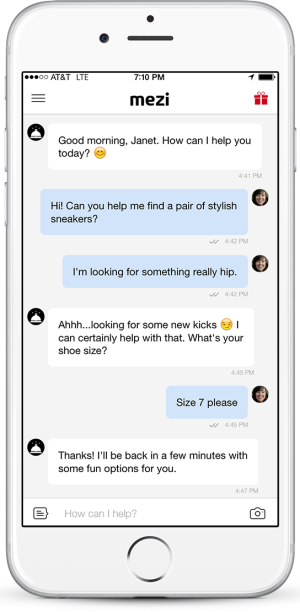There is an increasingly large roster of personal assistant apps that use artificial intelligence in an attempt to make users’ lives easier. Mezi is the newest contender and while it has plenty of competition, the service wants to set itself apart with what its founders call a “maniacal” focus on e-commerce, helping users with the most time-consuming shopping errands.
Created by the co-founders of Dhingana, the Indian streaming music service acquired by Rdio last year, Mezi launched today in the United States for iOS and Android. It has raised $2.8 million in backing from Nexus Venture Partners.
Mezi uses a text message interface (in fact, on Android the service is only available through SMS) and is geared toward busy people who need to take care of complicated tasks that usually take hours of research and emails, like finding out-of-stock items, purchasing and installing large appliances, or making group hotel and flight reservations. While many people like to shop for fun, Mezi assumes most users will come to it for errands they find onerous.
The app combines an artificial intelligence platform with human assistants, or Mezi’s “shopping experts.” Called Smart Assist, Mezi’s AI tech uses natural language processing filter out the most important information from text messages and pass it on to shopping experts, w ho then respond to users and finish taking care of each task. Smart Assist also learns and stores each user’s preferences, which in turn helps complete future requests more quickly.
ho then respond to users and finish taking care of each task. Smart Assist also learns and stores each user’s preferences, which in turn helps complete future requests more quickly.
While making the transition from streaming music to AI-assisted shopping might seem like a big leap, founder Swapnil Shinde, who founded Mezi with his twin brother Snehal, tells TechCrunch it was a natural move after trying to balance their personal lives with running Dhingana.
“One evening, Snehal was driving back from work in San Francisco and his wife had several things she wanted him to buy from different stores. He thought, how great would it be to take of everything in a few text messages,” says Shinde. “The advent of artificial intelligence means that every professional can have their own virtual shopping assistant and we can give it a truly human interface.”
Most requests will return three options and once a user books a service or makes a purchase, Mezi continues to update them with reservation or shipping information. Tasks Mezi has already completed for test users include tracking down a blazer from the Balmain X H&M collection, which was sold out online; researching and ordering running shoes; and booking international trips for large groups of passengers who wanted to sit next to each other on each flight.
Giving AI A Human Touch
Fine-tuning Smart Assist is the most important part of making sure Mezi can scale up successfully. When the service was first tested, it relied completely on human assistants. Now Shinde says work is split about 80-20 percent between people and Smart Assist, and the startup’s goal is to flip that ratio in favor of artificial intelligence.
“We’re almost to the point where requirements are very clear so our experts don’t waste time clarifying each request and can come up with recommendations instead,” says Shinde. “We want to reduce the pain point where experts have to do stuff that is repetitive across different questions. That’s one of our differentiating factors.”
The app will monetize through affiliate partnerships, but Shinde says it will remain “brand agnostic,” which means users will get options from a wide range of sites instead of just the ones Mezi works with.
Mezi is among several personal assistant apps that use a text message interface and rely on AI. These include GoButler, Operator, Agent Q, and M, an experimental feature from Facebook Messenger, all of which answer shopping-related questions in addition to other requests.
Shinde says Mezi plans to differentiate by not only focusing exclusively on e-commerce (the app won’t wake you up or help you win at Trivial Pursuit), but specializing in the most annoying tasks. As the app grows, it will develop different verticals, such as travel, fashion, or electronics. While the service is currently available only in the U.S., Shinde says Mezi’s platform is designed to localize quickly and enter markets other personal assistant apps haven’t tackled yet.
“We have kept that in mind, given our past experience building companies. From day one, it’s been designed to be currency-less and country-less. We believe we are in the right position to build a global product from day one.”
